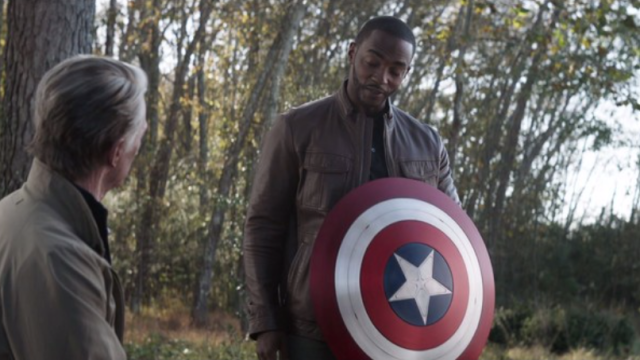Because the Captain America title is so deeply intertwined with the Avengers’ heroism and fight to keep the world safe, it was a big deal that the now-elderly Steve Rogers ended up deciding to pass on the mantle and the shield to his friend Sam Wilson in the final act of Avengers: Endgame. Anthony Mackie thinks so too.
In both the MCU and Marvel’s comics, Captain America exists as a symbol of American heroism who inspires hope in the hearts of the public—and now, Captain America just so happens to be a black man. For rather obvious reasons, Disney+’s upcoming The Falcon and the Winter Soldier series would do well to delve into the significance of Sam becoming Captain America. If the MCU’s reality is anything like our own, then Captain America suddenly being a black man would immediately become a hot topic of conversation, and Marvel has an opportunity to use these characters to explore complicated and difficult conversations about the way that race shapes peoples’ lives in America.
Whether the show will go in that direction remains to be seen, but at least some of these ideas are things that Anthony Mackie’s been thinking about during The Falcon and the Winter Soldier’s production process.
[referenced url=”https://gizmodo.com.au/2019/06/disneys-falcon-winter-soldier-has-to-explore-race-and-captain-americas-legacy/” thumb=”https://i.kinja-img.com/gawker-media/image/upload/t_ku-large/hlaamtoz1g2oy61dzn4e.png” title=”Disney’s Falcon & Winter Soldier Has To Explore Race And Captain America’s Legacy” excerpt=”Now that they’ve done their part to save the universe in Avengers: Endgame, Sam Wilson and Bucky Barnes are packing up their gear and jetting off to Disney+ to star in their own miniseries. Falcon & Winter Soldier is sure to give the duo an interesting space to define themselves as Avengers in a post-Endgame MCU. But the larger picture of Sam, Bucky, and Steve Rogers’ lives makes the series a choice opportunity to explore the MCU’s social and political climates in important ways.”]
In a recent interview with Deadline, the actor explained how he’s been sitting with his thoughts about what it means for him as a performer and what it means for Sam Wilson as a character to be given this newfound position of prominence within one of the most popular franchises in the entire world.
“You know what, to be honest, it’s very emotional. I’ve been in the business for 20 years and I’ve been fortunate to do some amazing stuff and work with amazing people,” he said. “For me, to be a black man in 2019 and be given the helm of Captain America with the history of black men in this country is a monumental step, not only in entertainment, but also in my life. It’s been extremely emotional. Look, my grandfather was a sharecropper, you know what I mean? There’s a lot of history and pain and triumph and joy that comes along with me being Captain America.”
Part of what’s made this journey so emotionally intense, Mackie explained, are the kinds of conversations that he’s been able to have with his sons about the kinds of things they, as young black kids, can actually dream about for themselves. It’s easy to lose sight of the fact that the MCU, like most superhero franchises, is still overwhelmingly populated by white characters, save for the handful of notable exceptions like Black Panther, Storm, and Cyborg. But by turning Sam into the Captain America, Marvel Studio’s putting another black hero front and centre and telling audiences that the person saving the world doesn’t have to be a blond white guy.
“I think the great thing about this project, and the reason I feel this is like winning a lifetime achievement award, is because now as fathers we can sit down with our sons and have a different conversation,” Mackie said. “In the past, it was always the conversation as black fathers that we had with our kids about how to be safe when they left home, about how not to entice police officers, about how not to walk through certain neighbourhoods. But now we can have the conversation with our sons about what it means for him to grow up and possibly be Captain America.”
While it’s great to hear about parents having those kids of conversations with their kids, it’d be that much better if The Falcon and the Winter Soldier followed in Black Panther’s footsteps and went out of its way not to shy away from the difficult realities its premise immediately brings to mind. Captain America’s a black man now—and when the show premieres sometime next year, it shouldn’t try to downplay the fact that his race, and the way other people see him, play important roles in the grand scheme of his life.
Disney+ will be live in Australia on November 19, but not those Marvel shows just yet.
